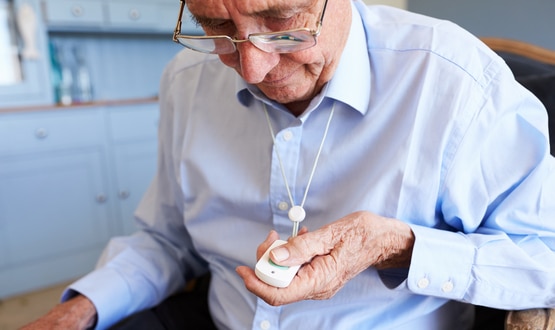Digital Switchover paused after personal alarms failed
- 30 April 2024

Virgin Media O2 temporarily paused the roll-out of its digital phone lines, following the deaths of two vulnerable people whose personal alarms failed when their landlines were switched off towards the end of last year.
The digital switchover is seeing the UK’s telephone network transition away from the traditional analogue system to a digital system. The analogue system will cease to operate by 2025, with phone companies moving their customers over to upgraded landline services that will rely on digital technology.
The deaths of two vulnerable Virgin Media O2 customers were reported in The Telegraph at the weekend, though the Department for Science Innovation and Technology (DSIT) has cautioned it doesn’t have information on whether the device failures were a “significant contributing factor or cause of death”.
Both customers were thought to have underlying health conditions. Both were using personal alarms for health support, which failed to function when their analogue landlines were switched off.
According to The Telegraph, Virgin Media O2 has said it did not provide the telecare devices to the deceased customers and had no reason to believe that the switchover had any part in the deaths.
The digitalisation of the phone networks will mean that all telehealth products reliant on 2G or 3G mobile connectivity will no longer be operational once the switchover is complete. Additionally, health alarms that rely on analogue phone lines for the exchange of voice and data between users and care services will need to be upgraded to digital technology.
A spokesperson for DSIT said: “We’ve been clear these provider failings are unacceptable. That’s why we stepped in to secure agreements with the biggest network providers and operators to strengthen protections for vulnerable consumers, meaning the majority of the telecoms industry is now signed up.”
A statement from Virgin Media O2 said: “Last December, alongside the rest of the telecoms industry, we signed a Government charter and paused all landline migrations as we reviewed our processes and made improvements. This included proactively checking the phone lines of those already migrated, enhancing communications and working more closely with the UK’s main telecare trade body. At this time no vulnerable or telecare customers are being migrated, and at the point these types of migrations do resume, additional checks will take place in the home to ensure landlines are active and that telecare providers are aware of any alarm unit issues.
“This essential switchover to digital landlines, which is a seamless process for the vast majority of customers, is a necessity as old phone lines become increasingly less resilient. While telecoms companies have a crucial role to play in this vital switchover activity, and we’re committed to helping our customers with this change, it’s essential that all parties including local authorities and telecare companies step up and meet their responsibilities. We encourage government to progress with a telecare charter to help facilitate better data sharing, equipment operability and in-home support and urge local authorities to come forward and work with us so that full end-to-end support is put in place for those who need it.”
In 2019 social security services provider Doro Care cautioned that telehealth providers were running out of time to support customers for the digital switchover.




1 Comments
I swear I thought old-style personal alarms and burglar alarms used a signal wire on the old analog phone systems, and this was why they won’t work when plugged into the analog socket on a broadband router.
However, when I look at the Age Concern and other websites, they suggest people move their plugs for their personal alarms onto their broadband routers.
Am I imagining all this?
Comments are closed.